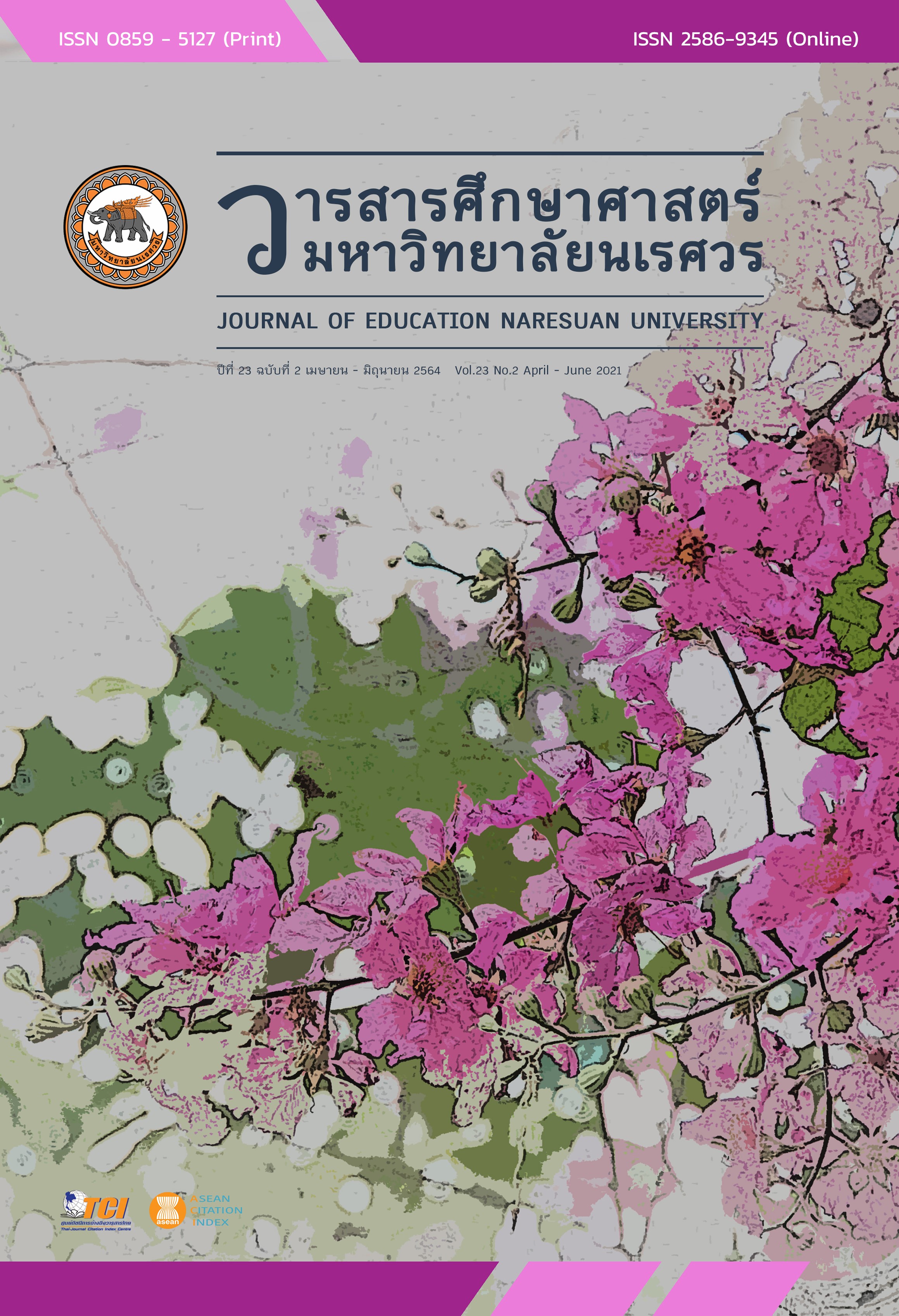DEVELOPMENT OF INDICATORS FOR THE CHARACTERISTICS OF MATHEMATICAL HABITS OF MIND OF LOWER SECONDARY EDUCATION LEVEL STUDENTS IN THE SECONDARY EDUCATIONAL SERVICE AREA OFFICE 40 การพัฒนาตัวบ่งชี้คุณลักษณะจิตนิสัยทางคณิตศาสตร์ของนักเรียนระดับชั้นมัธยมศึกษาตอนต้น สังกัดสำนักงานเขตพื้นที่การศึกษามัธยมศึกษา เขต 40
Main Article Content
Abstract
The purposes of this research were to 1) to develop indicators to the characteristics of mathematical habits of mind of lower secondary education level students and 2) evaluate the overall model fit between indicators to characteristics of mathematical habits of mind of lower secondary education level students and empirical evidence. The samples of this study were 400 lower secondary education level students in the secondary educational service area office 40 at Phetchabun. They were selected by multi-stage random sampling. The research instrument was 3 rating scale questionnaires for the characteristics of mathematical habits of mind of lower secondary education level students in the secondary educational service area office 40 which were 40 items. IOC is 0.60 to 1.00 and the reliability is 0.95. The data was analyzed using correlation coefficient and factor analysis. It was found that; the indicators for the characteristics of mathematical habits of mind of lower secondary education level students were 16 indicators. That consisted of Understanding the problem, Perseverance in solving problems, use appropriate tools strategically, accuracy in content, ddifferent way of thinking, sharing ideas, mixing deduction and experiment, using mathematical in solving, apply with new situation, practicing in action, mathematicians talk big and think small, flexible thinking, decisions with reason, mathematicians talk small and think big, making mathematical model and clearly and accurately communication. And the characteristics of mathematical habits of mind of lower secondary education level students were related to empirical data and construct validity. The goodness of fit index showed the following summation between the model and the empirical data with 2= 95.29, df = 76, p = 0.07, GFI =0.933, RMSEA = 0.025, CFI = 0.993, TLI = 0.989 and factor loadings of factors was values ranging from 0.294 to 0.834 with a statistical significance level .05.
Article Details

This work is licensed under a Creative Commons Attribution-NonCommercial-NoDerivatives 4.0 International License.
The owner of the article does not copy or violate any of its copyright. If any copyright infringement occurs or prosecution, in any case, the Editorial Board is not involved in all the rights to the owner of the article to be performed.
References
Costa, A. L., & Kallick, B. (2000). Discovering and exploring habits of mind. Alexandria, Va: Association for Supervision and Curriculum Development.
Cuoco, A., Goldenberg, E. P., & Mark, J. (1996). Habits of mind: An organizing principle for a mathematics curriculum. Journal of Mathematical Behavior, 15(4), 375-402.
Harel, G. (2008). DNR perspective on mathematics curriculum and instruction, Part I: focus on proving. ZDM, 40, 487-500.
Harnkajornsuk, S. (2018). A development of mathematics exploring package for enhancing mathematical minds of gifted students at the elementary level. Journal of Education Naresuan University, 21(1), 293-306. [in Thai]
Lim, K. H., & Selden, A. (2009). Mathematical habits of mind. In S. L. Swars, D. W. Stinson & S. Lemons-Smith (Eds.). Proceedings of the Thirty-first Annual Meeting of the North American Chapter of the International Group for the Psychology of Mathematics Education (pp. 1576-1583). Atlanta: Georgia State University.
Mahawijit, P. (2016). Mathematical habits of mind. IPST Magazine, 44(201), 20-23. [in Thai]
Mason, J., & Spence, M. (1999). Beyond mere knowledge of mathematics: The importance of knowing-to act in the moment. Retrieved June 1, 2019, from http://www.https://www.researchgate.net/publication/225853894_Beyond_Mere_Knowledge_of_Mathematics_The_Importance_of_Knowing-to_Act_in_the_Moment
NGA Center, & CCSSO. (2010). Developing content area literacy: 40 strategies for middle and secondary classrooms. Retrieved June 23, 2019, from http://www.corestandards.org/about-the-standards/branding-guidelines
Office of the Basic Education Commission. (2017). Indicators and learning standards of mathematics subject (Revised version in 2017) from the basic education core curriculum for 2008. Bangkok: The Agricultural Co-operative Federation of Thailand. [in Thai]
Srisatidnarakoon, B. (2002). The methodology in nursing research. Bangkok: Faculty of Nursing, Chulalongkorn University. [in Thai]
The Institute for the Promotion of Teaching Science and Technology. (2013). Basic education core curriculum of mathematic in secondary education manual. Bangkok: Ministry of Education. [in Thai]
The Institute for the Promotion of Teaching Science and Technology. (2017). Basic education core curriculum of mathematic in secondary education manual (Revised version in 2017). Bangkok: Ministry of Education. [in Thai]
Wiratchai, N. (2008). Development of indicators assessment. Academic conferences and dissemination of research on moral ethics. Bangkok: Ambassador Hotel Bangkok. [in Thai]


